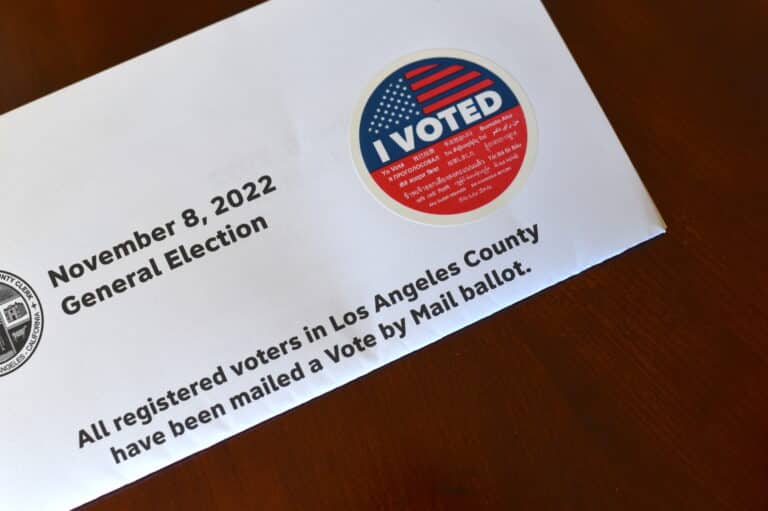
By Ted Vaill
A Special to Malibu Times
All California voters should have gotten their ballots by now, and there are seven statewide propositions, which you will have to evaluate prior to voting. Here are my analyses of these propositions, done as part of the Pacific Palisades Democratic Club Political Affairs Committee and as a VP of the Malibu Democratic Club.
In making this analysis, I have reviewed the positions of the Los Angeles Times, the California Democratic Party (CADEM), and the Pacific Palisades Democratic Party (PPDC), and the analysis of each proposition by ballotpedia.org. The Malibu Democratic Club has not yet taken formal positions on these propositions.
Here are the seven ballot propositions:
Proposition 1
Prop 1 provides a state constitutional right to reproductive freedom, including the right to abortions. No state has yet voted a constitutional amendment providing a right to reproductive freedom. Support comes from Gov. Gavin Newsom, CADEM, our two Democratic Senators and many state Democratic legislators, Planned Parenthood, the California Teachers Association, the LA Times, and the California Medical Association. Opponents include State Senator Brian Dahle (the GOP candidate for California governor), the California Conference of Catholic Bishops, and the Republican Party of California. Yes on Prop 1 has a significant lead in recent polls.
Propositions 26 and 27
These competing propositions both legalize gambling on sports events in California. Prop 26 legalizes gambling at the 64 American Indian gaming casinos, card rooms, and four licensed racetracks in California (two in Southern California and two in Northern California). And Prop 27 legalizes sports betting online. Both propositions authorize betting only by persons over 21. Betting on high school and college sports would still be illegal. Prop 26 would also expand the types of games allowed at Indian casinos to include roulette and craps. Incessant TV ads have bombarded the airwaves, but recent polls have shown that both propositions are likely to lose, with Prop 27 supported by 34 percent and opposed by 54 percent. It is being funded by seven online gambling firms such as FanDuel and DraftKings. The LA Times opposes both, while CADEM and the PPDC had no consensus on 26 and opposed 27.
Proposition 28
Prop 28 requires funding for K-12 art and music education in all public and charter schools. It does not raise new taxes, but rather sets aside a portion of the state’s general fund equal to 1 percent of the Prop 98 money (a 1988 ballot initiative that set minimum funding levels for K-12 schools and community colleges). If approved, it would increase state education spending by $800 million to $1 billion starting in 2023. The negative: it locks in this spending on arts and music in the future, even if the huge current budget surplus disappears. The LA Times, CADEM and the PPDC support Prop 28.
Proposition 29
Prop 29 enacts staffing requirements, reporting requirements, ownership disclosure, and closing requirements for chronic dialysis clinics. In particular, Prop 29 requires a physician or nurse practitioner to be onsite during treatment. It also requires clinics to disclose physician ownership interests, and report infection data. This same proposition was also on the 2018 and 2020 ballots, and again is placed there by the Service Employees International Union-United Healthcare West (SEIU-UHW), which is in a protracted battle with the the two largest private dialysis companies, DaVita and Fresenius. The LA Times and the PPDC oppose Prop 29, while CADEM supports it.
Proposition 30
Prop 30 increases the tax on personal income above $2 million by 1.75 percent and dedicates revenues to subsidize zero-emission vehicles and charging stations, and wildlife prevention programs. This proposition would push California’s already-highest state income tax rate from 13.3 percent to 15.05 percent. Prop 30 is backed by environmental and public health groups and firefighters and electrical workers, but is funded almost entirely by Lyft, which has spent $25 million in support of the measure. Newsom has recently come out in opposition to the measure. He has pledged $10 billion over the next six years on clean transportation initiatives, and the Biden Administration’s infrastructure law included $7.5 billion nationwide to build out a nationwide charging network. The Inflation Reduction Act includes up to $7,500 in tax credits for the purchase of a new electric vehicle. The LA Times urges a no vote, while the PPDC endorsed it initially before Newsom came out in opposition. CADEM supports it.
Proposition 31
Prop 31 upholds the total ban on flavored tobacco sales, including e-cigarettes, snuff, chewing tobacco, and tobacco-flavored enhancers. (It does not prohibit the sale to adults of regular cigarettes, hookah tobacco, loose leaf tobacco, and premium cigars.) It was approved by California voters in 2020. Since then, Big Tobacco has spent millions of dollars qualifying this ballot referendum to overturn it. A yes vote allows the law to go into effect, and the LA Times, CADEM, and PPDC support it. The opponents to Prop 31 argue that it is an adult prohibition, which has never worked. They say it will only lead to an increase in black market sales by criminal gangs.
And for LA County voters:
LA County Measure A
This County-wide measure would authorize the removal of the Sheriff by the Board of Supervisors for cause, requiring a 4 out of 5 vote. The LA Times and PPDC support it.
And for Malibu voters:
Malibu Proposition MC, Sales and Tax Measure
A “yes” vote on Malibu Proposition MC supports authorizing the City to levy a 0.5 percent additional sales tax, with revenue allocated to the general fund, increasing the total combined sales tax in Malibu to 10 percent. This would make Malibu one of the highest sales tax jurisdictions in the country.